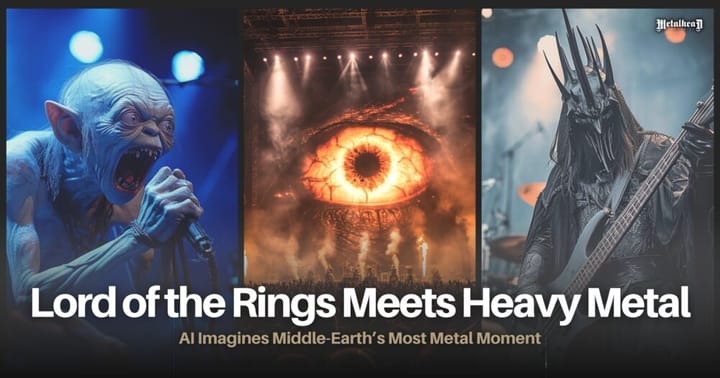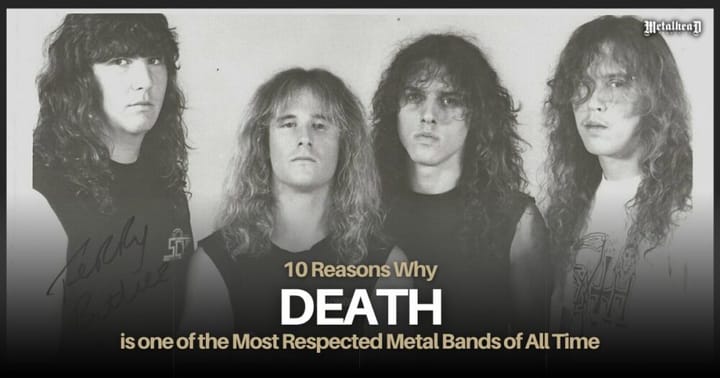Artists Should Make Music Because They Love Making Music, Not for Exposure or Following, Says Lenkyn Ostapovich of Canadian Metal Band Crystal Coffin
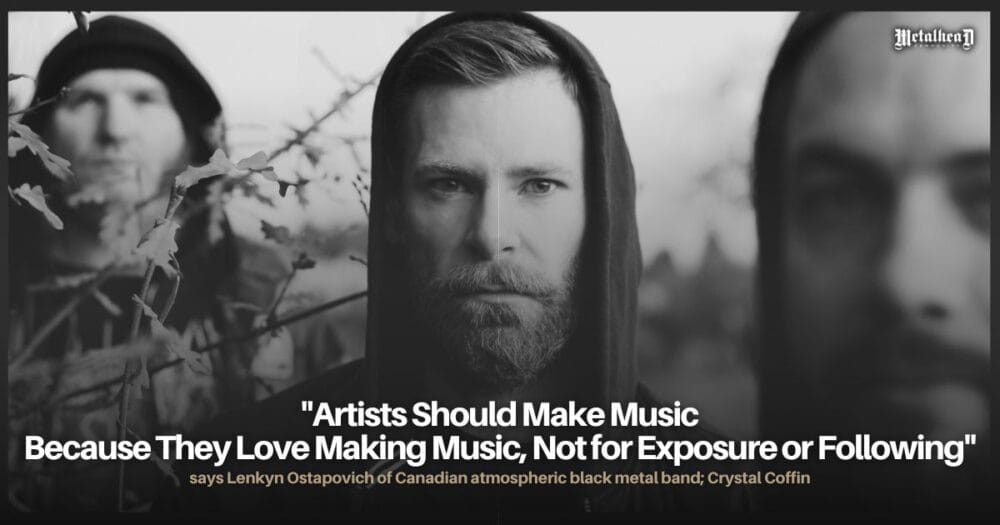
I remember hearing James Hetfield say, "We are in this to find like-minded people," when I was a teenager, and it left a lasting impact on me, even though I wasn't quite sure of what it meant at the time. After starting Metalhead Community in 2016, I acknowledged the term, and it became one of the important lessons I learned from my experience as a music enthusiast over the years.
Crystal Coffin caught my attention first with the dark energy in their music, and then convinced me with their musical taste and sludgy progressive compositions. Listening to their latest release, "The Starway Eternal," still brings me the same excitement as it did on the first day, making me proud to consider it one of the best metal albums of 2021.
I had the chance to interview one of the creators behind the project, Lenkyn Ostapovich, and learned about Crystal Coffin's musical concept, objectives, the metal scene in Vancouver, their upcoming plans, and the metal music community. So grab a cup of coffee, sit back, and let's go behind the scenes with Crystal Coffin.
Crystal Coffin - The Starway Eternal (Official Music Video). The Starway Eternal is the title track from Crystal Coffin's second album, released October 15th, 2021 via A Beast in the Field.
Q1 - How would you describe a regular day for Lenkyn Ostapovich? What is the percentage of making music in your daily life?
A1 – Being around music is a constant in one form or another, but the actual time I get to focus on writing new songs/parts or practice with Rob and Aron can really ebb and flow week-to-week. We all maintain fairly busy schedules and hold down FT jobs away from Crystal Coffin, but music in all its forms (from just listening, searching out/learning new bands, scouring local record shops to practicing new Crystal Coffin songs and performing) provides the necessary balance that definitely aids in getting through this world. As each recording cycle comes, I find that any spare time I have away from work is increasingly spent on recording guitar ideas or song demos and beginning the work on interstitial atmospheres or backing synth lines so that what we pull off in the studio under such finite constraints and stress is maximized.
Q2 - Two full-length studio album releases since 2020, how do you feel about your experience since Crystal Coffin started? And how was the feedback after your latest, The Starway Eternal?
A2 – With each studio session, we learn more and more about process, discipline, and the sonic results of our intentions when placed under such studio stresses. Each recording has become more layered with instrumentation and polish (from a production standpoint), but there's always room for improvement, and we want to push our creative intentions further alongside our playing abilities and songwriting. We have become quite comfortable with the process that worked leading up to the recording of The Starway Eternal: generally speaking, I write song ideas that, in a loose contextual demo, present a piece from beginning to end and then present it to the guys. We can tell fairly early on if overall the piece will work or not from just a bit of jamming on it. From there, we try to objectively look at each of the parts and pair them with appropriate rhythms and percussion as the arrangement starts to take form. Both Aron and Rob are incredibly sound in their judgments on how arrangements of my riffs/phrases could work and be re-worked and we've found success practicing these loose tracks up until they enter a first-round studio demo session. Hearing back the tracks via a high-quality demo allows each of us to critique the pieces holistically and hear the interactions between all the instruments/players rather than in the lead-up when we are generally only concerned with what we're each respectively playing in the moment. With these demos, it's then quite easy to re-arrange sections if needed - double the phrasing during an early verse or edit out passes of a repeated chorus, for instance - and then practice them up until final studio time is booked for. By then, I also have adjacent layers and backing synths/scapes written to be slotted into the mixes. Overall, as many will already know, it's a lengthy process with a lot of steps involved, but it's the sort of creative efforts the three of us love!
The immediate and longterm feedback from The Starway Eternal has been shockingly positive and we're so, so, so appreciative for the time many people have given it! The album had a very loose concept to help unite the content of the pieces therein and to help direct some of the synth/FX choices, but it also helped to solidify part of the band's identity thematically and for the longterm. We feel rather comfortable speaking/playing to otherworldly concepts, tones, and topics of mortality and strain and look forward to exploring more in these realms and sounds.
Q3 - What were the main influences in The Starway Eternal album, subjectwise and musically?
A3 – It seems that at some point during the first phase of songwriting and practices, we will come to a point where we brainstorm a loose story to underpin and focus the sounds and lyrical content. Our first album's (The Transformation Room) lyrics/theme had a reference to the Holodomor of Eastern Europe during the early 1930s and tethered our exploration of extreme earthy sufferings - either through choice or force - and how it may yield an infinite state of awareness, reflection, existence, and a fettered retaliation that can unite both our shared misanthropy and humanity in various ways. This decision by no means acted as our attempt to create a 'concept album' but rather we found that we benefitted from attempting a singular direction in our content development.
When it came time to cultivate our ideas for what would become The Starway Eternal, we knew that we wanted to keep ourselves symbolically linked to the Eastern European region, but also wanted to take some of the pastoral notions from The Transformation Room and modernize them, infused with a more technological, or spacey, feel. The realities of what happened in 1986 at Chornobyl Power Plant served as a setting for this album's storytelling and contained nearly everything we had wanted to include: its geographical location and connection to some of our family histories, the edge-of-technology and pursuant of sustainable future energies and sciences, the catastrophic spoil of best-laid intentions when set against the folly of human control and nearsightedness, and an inescapable influence that still lingers to this day. The real-world setting of Chornobyl also functioned as a launchpad into the cosmos for our protagonist and allowed us to explore the incredibly dark themes of isolation, abandonment, and self-immolation while still including a touch of melancholic beauty and hope that, at brief moments, can actually unite a body of people. These ideas gelled and became all too presient, given the geography and the implied symbolism throughout the album, when Russia invaded Ukraine just months after the release.
Musically, our band influences have always been quite steadfastly Enslaved, Wolves in the Throneroom, King Crimson, and Hawkwind. We try to write a brand of black metal that can be both aggressive and hypnotizing while still infused with melody and pathos. A track like the opener, Shapeshifter Huntsmen, was one of our more traditionaly black pieces but the entire middle section reveals our love for prog and instrumentation/layering.
Q4 - What would be the three things that make this collective special, in your opinion?
A4 - By now, we've been playing together for over six years. It took a while for us to realize what our best strategies can be for songwriting and development, but through the process we've been using all matters of critique and communication continue to get better and better over time. We're also actually friends with one another, which might sound like an odd aspect to point out, but I know of many bands where there are simply too many egocentric conflicts or disparate personalities involved that lead to an eccessive amounts of in-fighting and conflict. We respect one another and try to make time to test out all of our ideas so that everyone's voice is heard. Finally, I think that when it comes to lyrical content, thematic ideas, and the visuals of the band/merchandise etc we are all on the same page because we're all fans of vintage horror, so lots of ideas get expedited because we're all coming at them from the same reference points!
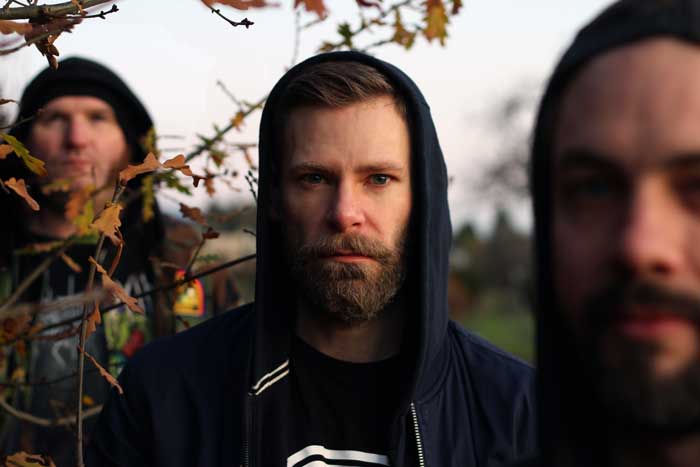
Q5 – A recent report says around 100,000 new tracks are being uploaded to Spotify every single day. How does that affect the music industry? And how does it make you feel as an artist?
A5 – I think the music industry has had some issues for a very long time and, if true, it's not surprising to hear a stat like that and how it implies over-saturation and diminished quality. A lot of marketplaces in life (music, theatrical film releases, everyday fashion, television fare, mass-produced digestible content, etc) are based on a lowest common denominator and are created with those sorts of audiences in mind since that sample size will maximize returns. It simply stresses that there will always be numerous subsections of consumers: those who are surface listeners may enjoy their media via pop stations, playlists, advertising, popular blogs, or social media, and through other such recommendations where metrics are wholly important while other consumers feel that they are more in-tune with a certain level of self-awareness or an identity and have an instinct to seek out artists themselves based on their personal or esoteric interests. It's for audiences like that that I'm not at all worried about the implications of a community like Spotify; they already know how to find the music they're after (be it for particular genres, regions, styles, histories, audio quality, whatever...) and are probably a more committed and active listener than another who might simply hit play on whatever playlist winds up on their app screen that morning.
To put it an entirely different way - it's not like the current state of how music is digested affects our approach to songwriting and releasing. We're not seeking a big break via streaming metrics or anything like that and have already witnessed people from across the world discover Crystal Coffin by their own volition. We would be recording and releasing music in any format and at any time, it just happens that we're do so during a Spotify age and that's fine.
Q6 - What are the future plans of Crystal Coffin for 2023?
A6 –We are recording our third full-length in February/March 2023 with Jesse Gander at RainCity Recorders once again here in Vancouver with a hopeful release date later the same year! Once the recording/mastering is out of the way, we will be playing the occasional show in support of the new material.
Q7 - If you get the chance to play your music for your musical idol someday; who would be that person? which Crystal Coffin song you'd play first? And why that particular song?
A7 – Because we have such an appreciation for the consistent creativity and progressiveness in every single one of their releases I think we would want to approach Enslaved. They would no doubt have extremely valuable feedback on our songwriting! And I could see Shapeshifter Huntsman being a fun one to showcase for them (and maybe even have Grutle share vocals with Aron on a verse or two if performed live) as we definitely wrote the midsection with their influence somewhere in our minds.
Q8 - What do you think about the black metal world, which acts lead the scene in your opinion?
A8 – In any genre of art that possesses such vast extremes you're going to find a lot of really interesting ideas, images, and personalities. That's probably why black metal has such a devout following as well as such a huge roster of impressive bands. We recently saw Hate (from Poland) come through Vancouver and were super impressed by their command on stage. They've been playing for years but it's always great to feel something so polished and powerful being played before you like that! And, as alluded to, we always are excited to see the new territories that a band like Wolves In The Throneroom venture towards with each successive release. The scenes they paint and the patience they can take to do so is always compelling if not hypnotizing.
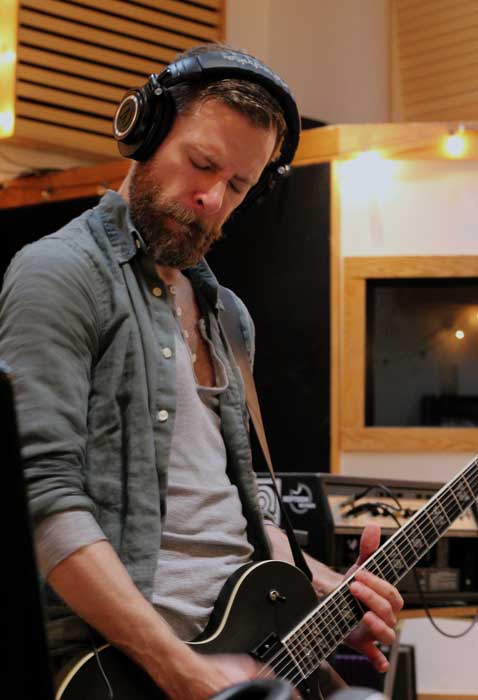
Q9 – What can you tell us about the local metal music scene in Vancouver? Any artists/bands you'd recommend checking out?
A9 – The live scene in Vancouver is finally back now post-pandemic it seems and there definitely doesn't seem to be any shortage of great projects. We're fans of local black act Vastatum, genre-morphing group Ritual Dictates, and beautiful post-meets-black group Ulvik.
Q10 – Why do you think independent artists and bands usually don’t get their investments back? Is it impossible?
A10 – It probably most has to do with exposure. Labels are in the business of getting their loans back and in order to do so they advertise through as many pertinent channels as possible. They have the resources and contacts to do so and a track record to know the sweet spot between an 'appealing enough band' and a 'target audience' to execute an appropriate business transaction. Independent artists typically operate with next-to-no budget and therefore don't have the resources to gain a level of exposure that will get enough ears and eyes on their music, let alone enough engineering and mastering "polish" to make their completed work something that people want to actually listen to. So it's an incredible uphill battle. There are government grant programs that can assist with creative projects financially, but the other side of matters is the drive, organization, communication, and acumen with which a band presents itself to others. Even if you have little-to-no resources to begin with, you can still conduct yourself as professionally as possible in your communications, ingratiate yourself among your peers, fans, and other professionals, and participate in your local music community to help build traction for your work. Over time, what you invested financially can come back through sales possibly, but it probably shouldn't be your ultimate goal from day one. Playing in such a subgenre pretty much guarantees that you won't be quitting your day job tomorrow, but if making money is your primary objective then, I would wager, the art could very well suffer for it.
Q11 - What makes a band/artist "great"? What was the first artist/band that taught you something, and what did you learn?
A11 – Everyone consumes music differently and with different levels of enthusiasm or intention. From many of the people in my life, we all seem to be searching for that next great find - an unknown album from eras ago or someone about to break into the public consciousness - while satiating our simple musical hungers for sounds that inspire and comfort. It could be because we've listened to countless albums by countless bands from years and years so it's become more difficult to be 'impressed' but with such musical thoroughness comes a pretty good barometer for outstanding songs/bands/melodies when they strike. When something gets played that sounds like nothing else you've heard to-date then that's always an exceptional experience! When I was a teen, hearing the expanse in King Crimson's music was novel for me at the time and I latched on and sought out every other band that was loosely related. Soon thereafter, hearing Monumension by Enslaved was a life-pausing moment for me as well. In recent years, it can be as simple as hearing a particularly haunting vocal delivery by Turkish singer Baris Manco or the maniacal arranging within songs by Amon Düül II and Comus - these moments when you get caught off guard and take pause to consider what it is you're actually hearing are those "great" moments because they're examples of artists not being scared to try new ideas or attempt expressions of their inner workings outwardly to a world that might not respond at all, but they did it nonetheless.
Q12 – What would be your piece of advice for someone who wants to form a band and start a career in music?
A12 – The advice I've always heard and would offer to another is to ensure you make music because you love making music, not because you're seeking a particular level of exposure or following. What you produce should make you happy or excise whatever demons/challenges you're faced with whether 2 or 200,000 people hear the final product. A lot of artists don't make their work because they want to per se but because they feel they need to. If that's accurate at all then it means that the artist is a conduit to let the art be brought forth by and how it's received publically is a much less crucial biproduct. And it's also worth mentioning that the world has changed into one where many of the barriers for releasing music have actually been removed. High-quality resources are available to learn various crafts and skills and create sounds at a very high level. If you have enough gumption you can market yourself online to a global audience, so you truly become your own limiter.
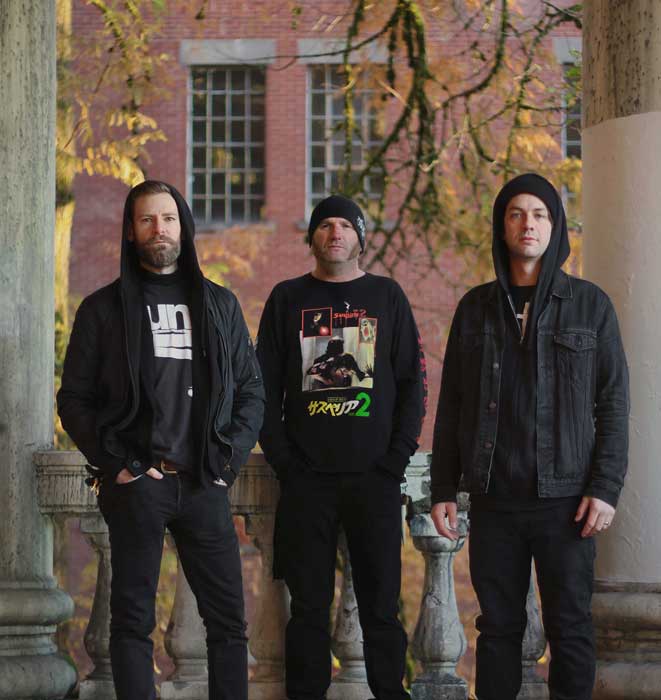
Q13 - If Crystal Coffin was going on a world tour, what other two bands would make the ultimate show together with you?
A13 – That's pretty difficult to say... I think we'd be pretty low on whatever the bill was though, haha! I could imagine participating in a festival lineup that included us, Gaerea, Krallice, WITTR, YOB, Full of Hell, Worm, and Ritual Dictates, with Enslaved headlining as being pretty great.
Q14 - Lastly, what would you like to say to our readers?
A14 – We always just want to take any opportunity we get to thank everyone for spending 41 minutes listening to The Starway Eternal and sharing your feedback with us online and via our channels. We also wish everyone in Ukraine and those who have escaped to surrounding lands as much safety and security as possible - We will be back in 2023 with new music!


